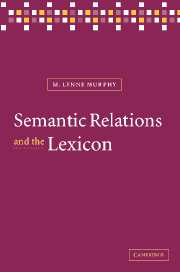Book contents
2 - A pragmatic approach to semantic relations
Published online by Cambridge University Press: 22 September 2009
Summary
It was all so nearly alike it must be different.
Gertrude Stein, Composition as explanation (1926)Following the assumptions of chapter 1, only information that is both arbitrary and relevant to linguistic competence is contained in lexical entries. If relations among words are not arbitrary or not entirely dependent on the linguistic properties of the words, then these relations are not represented in the lexicon. This chapter demonstrates that semantic relations among words indeed are not (and cannot be) represented in the lexicon for three reasons: (a) They are not relevant to linguistic competence; (b) they depend upon the contexts in which they occur; and (c) they are predictable by means of a single relational principle. Semantic relations among words thus consist of conceptual knowledge about words, rather than lexical knowledge of words (Murphy 2000). In essence, this chapter shows that a metalexical treatment of semantic relations is forced by the divisions of labor among lexicon, grammar, and conceptual knowledge, as well as by facts about relational phenomena.
This metalexical treatment provides the means to account for all lexical relations – not just semantic ones and not just the ones that have been acknowledged with ᾽nym names. So while Cruse (1986) goes to some pains to distinguish between “interesting” and “uninteresting” semantic relations, this treatment considers any paradigm-based relation interesting and explainable, no matter the basis of the paradigm.
Information
- Type
- Chapter
- Information
- Semantic Relations and the LexiconAntonymy, Synonymy and other Paradigms, pp. 25 - 60Publisher: Cambridge University PressPrint publication year: 2003
